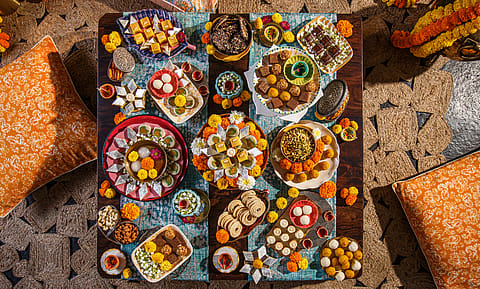Reimagining Indian mithai
The target of most of these brands is millennials who are eager to experiment with new tastes and textures.

Most of us love eating traditional mithais such as motichur laddoo or mysorepak but often avoid because they are either too sweet or too greasy. Do you know that most mithai makers add an overdose of sugar to increase shelf life of sweets? After all, sugar is the most affordable preservative. Do you also know that the coconut used in coconut barfi, more often than not, is synthetic coconut? These are among the host of reasons that have turned away many consumers from traditional mithais. Though most mithai shops have a collection of sugar-free mithais, consumers, at least in urban markets, don't mind replacing the good old mithai with chocolates and pastries, which are perceived to have lower sugar content.
However, a bunch of entrepreneur-led businesses such as Bombay Sweet Shop, Khoya Mithai and Ornamental Mithai are trying to bring back the magic of traditional mithais. While Delhi-based Khoya Mithai is attempting to bring back the traditional halwai into Indian homes, the likes of Bombay Sweet Shop and Ornamental are reinventing mithais with a contemporary twist. "We understand the history of mithais, how it was made in the past without using artificial flavours and replicate it," says Sid Mathur, Founder and Director, Khoya Mithai. Mathur says not only are his mithais less sweet, he sources ingredients of certain textures that characterise those sweets. "The besan in besan ladoos needs to have a certain coarse texture, so, we have managed to get a vendor who gives us the required coarseness. Similarly, the coconut in our barfis contains organic coconut and not the flavour. We put coconut into the sugar syrup and then add it to the mithai," says Mathur.
On the other hand, Yash Bhanage and Sameer Seth, Founders of Hunger Inc. (which owns Bombay Sweet Shop), aspire to be the Willy Wonka of the Indian mithai segment. The duo wanted to reimagine the traditional mithai, which led to them to a culinary tour across the country, after which they launched a range of fusion sweets like kaju bon bon (the ubiquitous kaju katli loaded with the bitterness of chocolate), patissa bar (Punjabi patissa reimagined into a caramelised bar) or the classic kheer kodom from Bengal tweaked with coconut stuffing. "Though we decided to reimagine our traditions, we also realised that people will come back to us only if our offerings are delicious. Fusion, as you know, is an abused phrase, so we have to be careful," says Yash Bhanage, Co-Founder, Hunger Inc. "Almost 80% of our sweets are reimagined and a lot of our innovations are influenced by our patrons who gave us suggestions on a Whatsapp group," says Sameer Seth.
The target buyers of most of these brands are millennials eager to experiment new tastes and textures. Pastry chef-turned-mithai maker Neelam Saini (Founder, Ornamental Mithai) says her mission is to restore the 'lost respect' of traditional Indian sweets. "The pastry chef in me has pushed me to make mithais alluring. I call by mithai brand progressive where I have married a host of ingredients." The Ornamental Mithai portfolio, like that of the Bombay Sweet Shop, is tweaked to suit millennial taste buds. From blueberry and rose motichoor ladoos to citrus essence (inspired by the famous orange burfi of Nagpur), Saini claims a lot of thought and experimentation goes into her mithai creations.
Premium Tag
These new-age mithai makers are not just trying to restore the glory of Indian sweets, they are also trying to use the best ingredients. Saini of Ornamental Mithai says she sources her cashew nuts from Goa and uses only peshawari pista. Using authentic, traditional ingredients obviously has a cost, and therefore these mithai brands come at a fair bit of premium.
The average basket at Bombay Sweet Shop, for instance, costs Rs 1,200-1,500 (as opposed to a traditional sweet shop where average price of a box of sweets is Rs 300-400). Seth claims it's difficult to catch up with demand during the festive season.
Recommended Stories
The trend of premium sweets is catching on with legacy sweet-makers too. Second generation entrepreneur Ankush Dadu, Director, Marketing and Growth), Anand Sweets & Savouries, says luxury sweet hampers contribute almost 50% to the Bangalore-based sweet store's revenue during the festival season. "I am not sure if it is an outcome of the pandemic. Consumers are gifting less this year but are opting for luxury hampers. There are select people who they want to give gifts to and they want to spend lavishly on those gifts." Anand Sweets gift hampers cost between Rs 2,000 and Rs 10,000. They are also packaged fancily in digital printed boxes with gold enamelling and so on.
Direct-To-Consumer
While it is not surprising for new-age brands such as Bombay Sweet Shop or Khoya Mithai to have a D2C business model, even legacy brands such as Haldiram, Bikanerwala and Jaipur's Laxmi Misthan Bhandar have embraced digital in a big way.
Bombay Sweet Shop and Khoya Mithai founders say that while most of their customers explore their offerings online due to pandemic, many prefer to come to the store. "Our USP is our experience centre where we show our clients how we make our sweets," says Bhanage.
(INR CR)
"The contribution of online to our overall sales has increased from 4% to 15% in the past year, but our clients, especially those who buy in bulk for weddings and other events, prefer to visit our stores and have a conversation with us," says Mathur of Khoya Mithai.
Are the good old mithais making a comeback as popular gifting options this festive season? The new-age mithai makers are determined to do so.